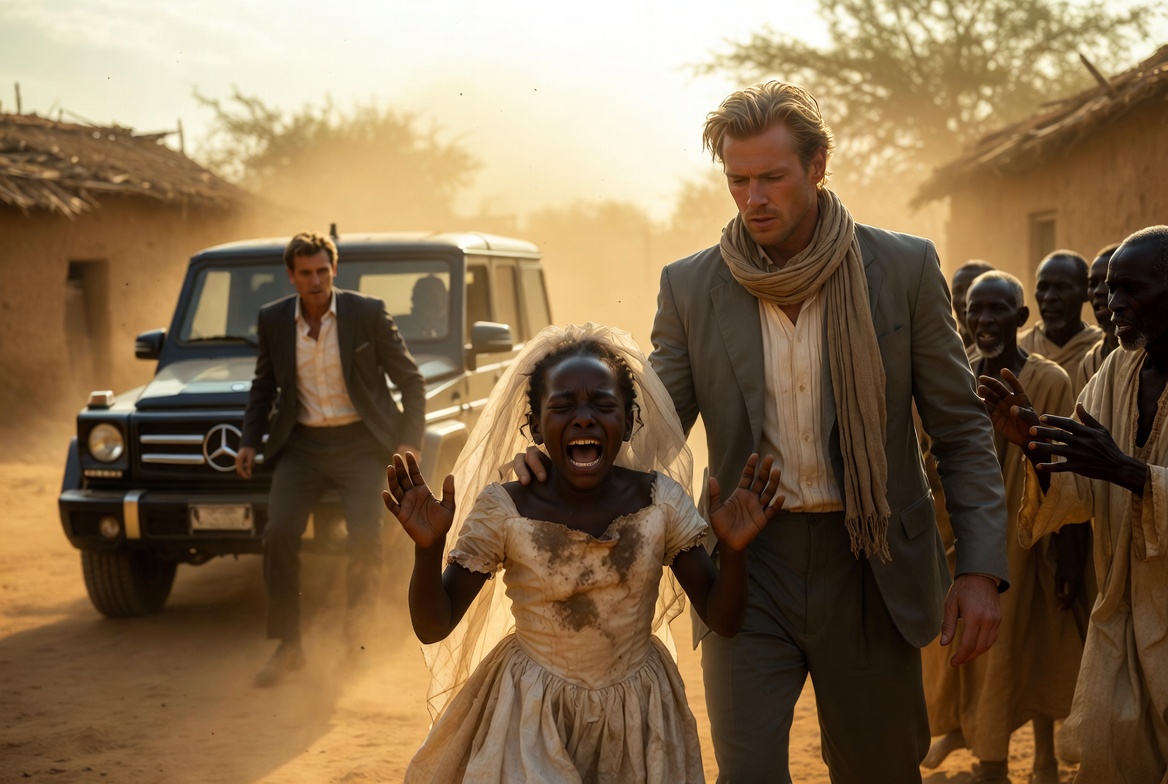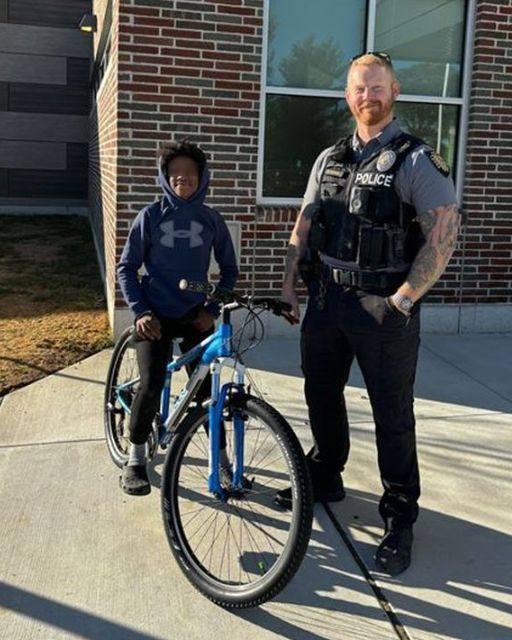In the fierce midday heat of a small village in Niger, Amina, a fourteen-year-old girl who had lost both parents, swept the packed-earth yard of her uncle’s compound beneath a merciless sun. Since the day she arrived, her aunt and uncle had turned her into little more than unpaid help: a slap for every dropped plate, empty bowls for every small error, and endless reminders that she carried a curse in her blood.
One afternoon, a prosperous merchant arrived from a distant town with gifts and kind words, asking to marry Amina. Her uncle sent him away with contempt. “This one brings no value,” he growled. “She will go to whoever I decide.”
Two days passed. The family gathered in the dim main room, and the uncle declared her future without looking at her. “She will marry the beggar who sits beside the market well. At least he costs me nothing, and my grain will stay in my own storeroom.”
Silence fell, broken only by sharp intakes of breath. Everyone knew the man he meant: Ibrahim, the quiet figure always wrapped in ragged cloth, leaning on a worn stick, legs twisted since childhood, eyes lowered to the dust.
Amina felt her chest tighten, yet she kept her gaze on the floor. She had long ago learned that dreams only invited heavier blows.
Three days later the wedding took place beneath a single neem tree. Villagers came more to mock than to celebrate. “An orphan and a beggar—perfect pair,” they murmured behind their hands. Amina wore a faded wrapper dyed from an old mosquito net. Ibrahim stood beside her in silence, his face peaceful, his thoughts hidden.
When the brief rites ended, her uncle thrust a small bundle of her belongings toward Ibrahim. “Take her. She belongs to you now.”
Amina walked behind her new husband without protest. Instead of turning toward the market, Ibrahim guided her past the last mud walls of the village. There, beneath an acacia, waited a gleaming black SUV—something Amina had seen only in passing photographs.
She halted, afraid to believe her eyes. “Where are you taking me?”
Ibrahim’s gentle voice answered, “Home.”
The driver stepped out and opened the door. Cool air and the scent of clean cloth flowed over her. On the seat lay sealed bottles of water and packages of food she had forgotten existed. The car rolled forward, raising small clouds behind it, and the village shrank into the red haze.
Amina’s fingers tightened around the bottle in her lap. Finally she whispered, “You are not truly a beggar… are you?”
Ibrahim gave the smallest of smiles and said nothing.
For the first time in years, a spark of wonder warmed her chest.
The car climbed into greener hills and stopped before a white two-story house surrounded by flowering bushes and the sound of running water. Amina stared, unable to speak.
Ibrahim opened her door himself. “Welcome to the place that belongs to you now.”
Inside, uniformed staff bowed with respect. “Good evening, sir,” they said in unison. Amina understood in an instant: the torn clothes, the stick, the market corner—everything had been a disguise.
That night, at a table covered with dishes she had never tasted, Ibrahim laid the past bare. “Twelve years ago your uncle deceived my father, seized our land, our business, our name. My father died of a broken heart. I promised myself I would return one day—not to destroy, but to discover whether a single drop of goodness remained in that house.”
Amina’s spoon stopped halfway to her mouth.
“I lived among you as the lowest of men,” he went on quietly. “Every person in your compound turned away in disgust. Every person… except you. You brought water when no one watched. You greeted me like a human being. You looked at the man, not the rags.”
Tears slid down her cheeks.
“So when your uncle chose to throw you away,” Ibrahim said, “I chose to catch you.”
Weeks became months. Ibrahim treated her with steady respect. He arranged private lessons, placed books in her hands, listened to every dream she dared to voice. Fear loosened its grip; in its place grew quiet strength.
Word of the “beggar’s” true wealth traveled fast. One morning her uncle stormed the gate, face twisted with rage and humiliation. “You made a fool of me in front of the whole village!”
Ibrahim met his glare without flinching. “I only showed who was poor in spirit.”
The uncle demanded compensation, threats tumbling from his mouth. Ibrahim refused every coin.
That evening Amina wept in the garden. “He will never leave us in peace.”
Ibrahim took her hand. “Then we will teach him that mercy is stronger than hatred.”
The following dawn, Ibrahim returned to the village—not limping, not ragged, but dressed in quiet authority. Amina walked at his side, head high, wrapper bright and new.
He asked the chief to call every household. When the crowd pressed close, Ibrahim spoke with calm power. “I came once as a beggar to see your hearts. Today I come as myself to keep a promise.”
He placed thick folders in the chief’s hands. “These are the title deeds to every field your uncle stole from this community. The land belongs to the village again. Let no child go hungry because of one man’s greed.”
A cry rose from the crowd. The uncle dropped to his knees in the dust, mouth working soundlessly.
Ibrahim turned to him. “I do this because your niece reminded me that forgiveness is the greatest wealth of all.”
Amina stepped forward, voice clear and steady. “Uncle, I forgive you. But you must promise, on your life, never to harm another soul.”
For the first time, the man bowed his head and cried like a child.
From that day forward, Ibrahim and Amina built The Amina Foundation. Orphans found shelter, girls escaped forced marriages, classrooms filled with eager voices. Ibrahim used his resources to strengthen rural schools and clinics; Amina traveled the country telling her story: poverty of pocket never equals poverty of heart.
Years later, in the capital’s largest hall, Amina stood on a stage lit by bright lights. Hundreds of young girls looked up at her.
“I was sold to a beggar,” she said, smiling. “Instead, I married the richest man I have ever known—the one who taught me that love rooted in dignity can heal entire villages.”
Thunderous applause filled the room. In the front row, Ibrahim watched her with quiet pride.
Their journey stands as proof that sometimes the girl with nothing in her hands carries everything in her soul.
The End.




